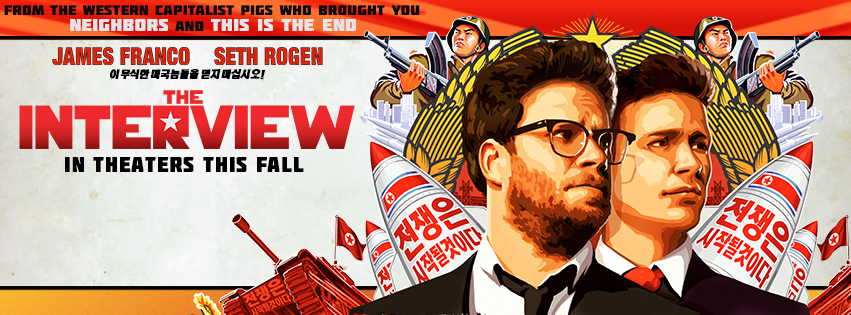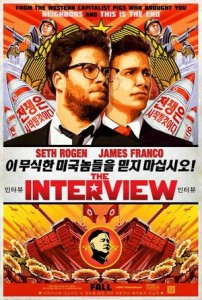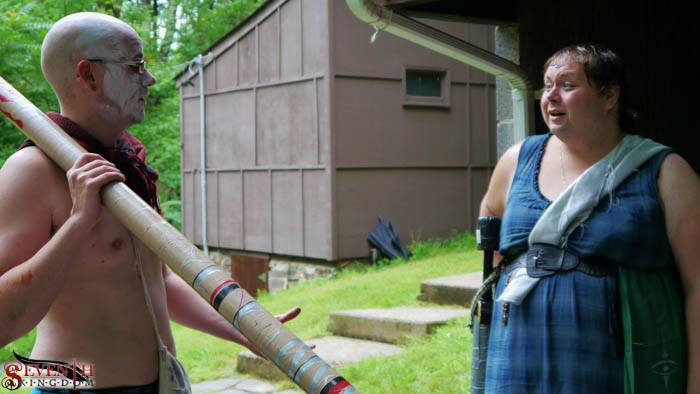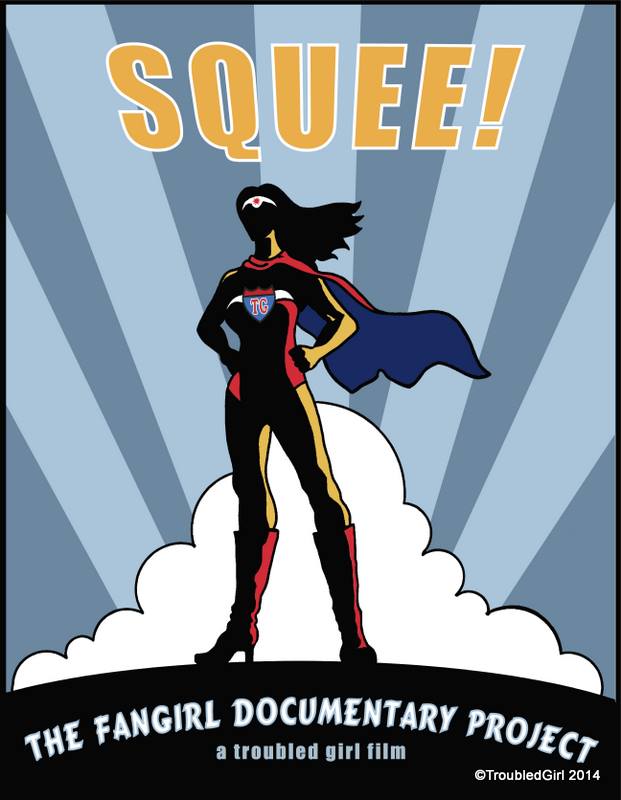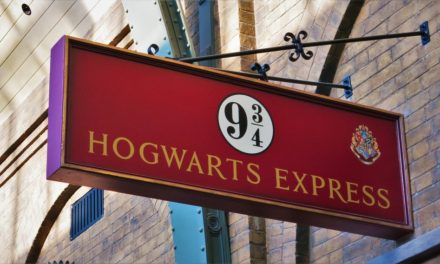Author’s Note: Title changed to reflect revised view. For more information, skip to the section below the video.
It’s funny because it’s true.
It’s easy to see why The Interview resulted in cyber attacks from North Korea. In The Interview, entertainment journalist Dave Skylark (James Franco) and his educated producer/best friend Aaron Rappaport (Seth Rogen) make a pact to be a little more serious with their show and score an interview with Kim Jong-un (Randall Park), North Korea’s oppressive leader. An American agency hires them to assassinate the leader. Hi-jinks ensue, but this isn’t the ‘get-stoned-and-discover-yourself’ journey you might expect from Rogen and Franco, proving that a film can be simultaneously hilarious and serious.
The first 25 minutes of this movie are pure comedy gold – so much so that I initially wondered if the movie’s best moments were frontloaded. What begins as a comedy remains so, but also becomes social commentary and statement – not just on North Korea’s policies, but on American culture and policy as well.
That, and it does a lot you might not expect from this type of film. There’s a well-intentioned tumblr post making the rounds educating us about how the DPRK wishes us to view them as a joke to divert from the real tragedy and oppression happening under that regime (and that a comedy about the country only makes this goal easier for them).
And while that makes sense and the author’s first-person experiences are likely valid and heartfelt, I am certain that The Interview will only bring more attention to real struggles in the real world – because in this carefully edited film, facts about concentration camps and food deprivation are repeated. In the middle of a comedy, the facts about oppression in North Korea are deliberately stated at least twice in a serious fashion.
Additionally, I was initially ready to file this movie under ‘stoner comedy’ and leave it at that, but I’m placing it firmly in the feminism category first. Here’s why.
Minor spoilers ahead.
What worked:
-
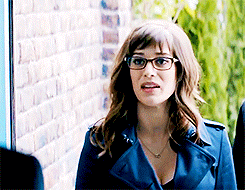
Lizzy Caplan as Agent Lacey. Image: http://satchp.tumblr.com/post/97991463655/agent-lacey-in-the-interview
Aside from Kim Jong-un, the two most powerful characters in the movie are women – Sook (Diana Bang) and Agent Lacey (Lizzy Caplan). Sook is head of Jong-un’s security forces and Lacey is the agent in charge.
- Only one violent action happens to a female character in the movie. It’s a punch during an action scene. This is in comparison to extreme violence that happens (seriously and comedically) to the male characters.
- The Interview does include and highlight facts and figures about the suffering undergone by people in North Korea as well as its oppressive regime. In fact, these numbers are even repeated in another scene.
- A main theme of the movie is presented early. Skylark’s guests reveal that they say offensive things because they really hate (or didn’t know how to deal with) something about themselves rather than other people.
- Rappaport and Sook’s mutual attraction is about more than sexual attraction. While he is the first to admit attraction after meeting her, she is the one that pursues him.
- While Skylark is offensive, he is part of the satire, representing what is wrong with America.
- One character also directly calls out American injustice as well, referencing the high percentage of the population in prison as well as some other key facts.
- Rappaport and Skylark are close friends – so close that Skylark often uses relatable and hilarious Lord of the Rings metaphors to describe their relationship. The best part about it is how they keep each other in check – and Rappaport actually calls Skylark out when he’s being offensive.
- “Women are actually smart now.” On the surface, a line that might garner offense – but of course what it really reveals is the exaggerated male perception of viewing women as capable now despite the fact that they have been capable well before #HeForShe.
- Agent Lacey rather realistically and directly calls the men out on their sexism.
- Ultimately, when the men are distracted by a moderate/work-appropriate show of cleavage, it’s shown to be their fault, not the fault of the woman for dressing herself that way. That might not seem like much, but particularly in this genre, it’s subtly progressive.
- The crew behind the scenes of David Skylark’s show is more diverse than you might expect for this movie. I kept bracing for the fat joke about Jackie #1 (Dominique Lalonde) – and thankfully it never happened. Yes, a not-skinny-woman actually survived a contemporary comedy without a fat joke.
- There is no ‘winning’ of the ‘hot female love interest.’ There’s consensual sex and a man crushing on a woman that results in no sexual action because she doesn’t feel like she owes him something – because…she doesn’t. This is atypical for this type of comedy.
Diana Bang as Sook:
What didn’t work or might not work for you:
- There is a gratuitous semi-orgy type scene with the type of fetishization of Asian women still unfortunately typical in these films.
- Male sodomy is a theme. If you’re not comfortable with it, you’re not going to enjoy this movie. EDITED TO ADD: You’ve got a lot of butthole jokes and bathroom humor, but the most serious drawback of this movie is the rape of a male character. In a life-or-death scenario, he is pressured (by male and female characters, via audio communication) to insert an uncomfortably large object into his body. A friend asked me if I meant rape when I said ‘male sodomy is a theme.’ While the character technically committed the action himself, the plot and other characters (one representing the interests of the United States of America) left him with little to no choice. This unfortunately detracts from the stronger themes of the movie, including the strong but controversial opening of the film. Furthermore, this takes credibility from the otherwise feminist, gender-equal plots, characters, and events in the movie. Yes, we understand the symbolism of being forced to do something nonconsensual by the American government as a price for enjoying the freedoms we have, but this plot incident is a valid and blatant reason for an audience to lose empathy for the characters or the movie’s mission – or to avoid seeing the movie altogether. This could have been avoided by having Rogen’s character simply do something – anything – he didn’t want to do…just because the government said so. It could have been as ridiculous and innocuous as eating a vegetable he doesn’t like.
- A lot of painful stuff happens to the male characters. Often. And usually in the butt.
- Skylark in particular is offensive, speaking with a North Korean accent in excess, etc. – he goes over the line, not just mocking the oppressive regime but Asian people in general.
- Yep, there’s foul language, abso-f**king-lutely. If you aren’t a fan, this isn’t for you.
The Interview is honest, deliberate, and slicing through tired tropes and bullshit that typically limits a comedy’s demographic.
4 / 5 – strongly recommend.

